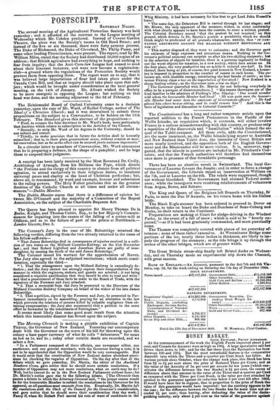The Morning Chronicle is making a pitiable exhibition of Captain
Fitzroy, the Governor of New Zealand. Yesterday our contemporary dealt with the Governor on the score of his bill for throwing upon the colony a base paper currency of what he calls " debentures" for sums as low as 5s. and 2s. ; today other notable deeds are recorded, and we select a few.
- " In a Parliament composed of three officials, one newspaper editor, one auctioneer, and one general merchant, with the Governor having a vote, it is not to be apprehended that the Opposition would be very unmanageable. But it would seem that the constitution of New Zealand makes abundant provi- sions for checking the vagaries of Opposition. On the day after that of the debate which we gave yesterday, Dr. Martin, the editor of the Auckland Southern Cross, gave notice that he should move certain resolutions. If a member of Opposition may not move resolutions, what on earth may he do ? Well, but be cannot do so In the New Zealand Parliament without leave; for Dr. Martin's notice gave rise to the following debate. [The Chronicle then quotes a debate in which the Attorney-General said, " the proper course would be for the honourable Member to submit the resolutions to the Governor for his approval, as all questions must emanate from him. Eventually, Dr. Martin left use resolutions with the Clerk of the Council for the Governor's consideration, and gave notice that he should move their consideration that day week.) Fancy if, when Sir Robert Peel moved his vote of want of confidence in the
Whig Ministry, it had been necessary for him first to get Lord John Russell's;
leave!
" The same day, the Debenture Bill is carried through its last stages; and Mr. Brown, the only opponent of the measure, wishes, in strict conformity with what clearly appears to have been the custom, to enter a written protest: The Colonial Secretary moved ' that the protest be not received,' on this ground, which detects in Dr. Martin's protest a peculiarity which we should think might he predicated of all protests whatsoever, namely, that ' rr cote- TAINED ARGUMENTS AGAINST THE MEASURE WITHOUT MENTIONING ems FOR IT.'
" This matter disposed of, they went to estimates; and the Governor gave his estimate of large expenses and precarious means. Nothing in the Go- vernor's political economy can surprise us after his two-shilling assignats; but in the selection of objects for taxation, there is a perverse ingenuity in finding out the worst objects for taxation, in a new society, which does amaze us. In the first place, the very productive tax on spirits is reduced one-half. In lieu thereof, there being as yet, of course, few good houses in New Zealand, a house- tax is imposed in proportion to the number of rooms in each house. The co- lonists are, with laudable energy, introducing the best breeds of cattle • so Go- vernor Fitzroy claps a tax on the importation of lire-stock I New Zealand is a sheep-feeding colony ; so the Governor puts a tar on dogs ! [The Governor quarrelled with Dr. Martin for not believing everybody irt office to be a paragon of disinterestedness.] " Ills taunts thereupon are of the kind familiar to the admirers of Fielding's Mrs. Slipslop: One would wonder with whom the honourable Member had lived.' He was quite sure the honour- able Member had never been the associate of Government-officers.' He had placed him where he was sitting, and he could remove him'! And this is the farce of legislation and discussion in Colonial Councils I"


























 Previous page
Previous page